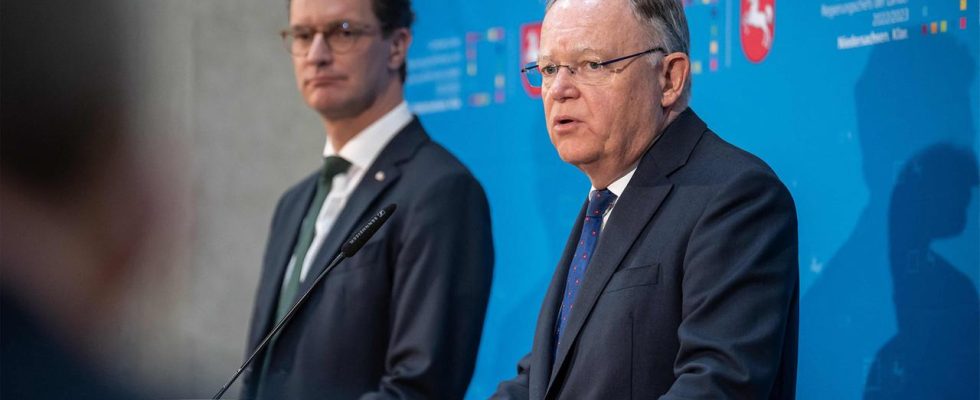In the Chancellery, consultations have been going on for hours: the federal and state governments want to find solutions to the dispute over the costs of caring for refugees. The countries stand together and demand, among other things, tough action from the Chancellor.
It’s a tough task that the federal and state governments have to drill through at the refugee summit. While the latter insist on more money to help cities and municipalities to care for refugees, the federal government is opposed. From the point of view of the federal government, it already contributes disproportionately to the costs.
Immediately before the consultations with Chancellor Olaf Scholz (SPD), which had been going on for hours – and at times separately – the chairman of the Prime Ministers’ Conference, Lower Saxony’s Prime Minister Stefan Weil (SPD), and his deputy, North Rhine-Westphalia’s Prime Minister Hendrik Wüst (CDU), made a statement. After the deliberations of the country heads, they appeared in front of the press an hour late – because the topics that were being discussed in the Chancellery were really difficult, said Weil.
Wüst: Scholz now has to show leadership
Both heads of government made it clear that the 16 countries agreed on all points across all parties. Together with the municipalities, they pull together and insist on sustainable solutions in caring for refugees.
Wüst criticized that the federal government had not shown sufficient awareness of the problem – that was regrettable. The situation in the municipalities is serious, “the limits of what is possible have been reached in many places,” said the minister. Above all, the costs for accommodation would have to be borne by the federal government.
The CDU politician asked von Scholz to make the issue of refugee care a top priority. There must be fair, reliable financing. Because what the municipalities need is planning security. With the number of refugees coming to Germany, the financial share for care on the part of the federal government must also increase, according to Wüst.
Because: Need dynamic system
Weil also emphasized the tense situation in the cities and communities. The accommodation and integration of people is a task that lies on the shoulders of the municipalities. In order to be able to accomplish this, a dynamic and breathing system is necessary.
The SPD politician pointed out that the federal government could not regulate everything. A lot has to happen in migration policy at European level too. For example, it is about concluding readmission agreements with the countries of origin and accelerating procedures.
Also digitalization in authorities should be improved
A draft by the Prime Ministers states: “The federal government will increase the refugee allowance to the federal states by one billion euros for 2023, so that the federal states are supported in further relieving their municipalities and in financing the digitization of the immigration authorities. ”
In the paper, the countries also demand full reimbursement of the costs for accommodation and heating for refugees, payment of a monthly per capita flat rate as well as integration costs and costs for unaccompanied minors.
Weil and Wüst expressed their determination to reach a conclusion at the refugee summit. In return, according to Wüst, he will stay in the Chancellery a little longer.
Dampened hopes from the Saarland
Other Prime Ministers had previously made their positions clear with regard to the meeting. Schleswig-Holstein’s Prime Minister Daniel Günther (CDU) appealed NDR info to Scholz not to be hard-hearted on the refugee issue and announced that the countries would not back down at the summit.
Saarland Prime Minister Anke Rehlinger dampened hopes for a major breakthrough. In her opinion, the turning point that some FDP politicians are calling for in migration policy will not happen, said the SPD politician in the Deutschlandfunk. Rather, it is a matter of “implementing what has perhaps already been agreed with one another even more consistently and in a technically better-positioned manner”.
She also reiterated the demand that more money should flow from Berlin to the federal states and municipalities. Rehlinger expects Federal Finance Minister Lindner to act as “enabling minister”. “The burdens are extremely high in the municipalities, in the states. Of course, the federal government has already given a lot of money, but at the end of the day it’s not enough at the moment.”
Ramelow: Mood is bad
In this context, Thuringia’s Prime Minister Bodo Ramelow again insisted on a “per capita amount” that the federal government should pay for refugees. In addition, from the point of view of the left-wing politician, additional money is needed to care for seriously ill people who are fleeing to Germany. “The costs of their medical care cannot be left to the counties and urban districts,” said the Prime Minister.
For him, the meeting today is not under a good star. “In the run-up, the federal government did not even comply with the usual forms of politeness in communication,” said the left-wing politician. “The paper presented so far by the Federal Chancellery is non-negotiable for me.”

